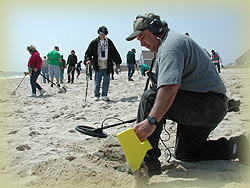Hunting for Buried Treasure the Passion of this Club.
Charlestown, RI, May 1999
By David Henley STAFF WRITER
 CHARLESTOWN
-- Late afternoon beach-goers are accustomed to the sight of a handful of
people, hunched over their equipment and their ears encased in headphones,
searching the sand with metal detectors for items tourists have dropped. Many
have thought it an odd little hobby for folks who like coins and jewelry.
CHARLESTOWN
-- Late afternoon beach-goers are accustomed to the sight of a handful of
people, hunched over their equipment and their ears encased in headphones,
searching the sand with metal detectors for items tourists have dropped. Many
have thought it an odd little hobby for folks who like coins and jewelry.
It turns out, however, that the odd little hobby is becoming an organized avocation, and the uses being found for metal detectors are helping them gain serious respectability.
About 30 or 40 of the hobbyists have been meeting monthly at Cross Mills Public Libraary, comparing notes and treasures, talking about how to best find things without upsetting nature or the neighbors and offering their services to archaeologists, criminal investigators and folks who have lost something of value to them.
DiscoveRIn Rhode Island's Treasures is described by its president, Charlestown's Richard Rice, as a "historical research and metal detector recovery society," the goal of which is to find and preserve Rhode Island's and eastern Connecticut's history. And, from listening to the members of the group, it seems they use beaches only to practice and hone their skills, with the goal to uncover the most interesting and unusual historical artifacts they can find.
On display at the most recent meeting of the group, on a beautiful and sunny noontime May 16, were items Rice had collected at a Revolutionary War encampment at a friend's farm in Vermont, a collection of 1960's Hot Wheels miniature cars found by Carl Morales, who combines detecting with scuba diving, hundreds of rings of all types found by Mike Robinson and several dozen turn-of-the-century tokens found by Bob Sullivan at the bottom of California Jim's pond in Peace Dale after it's dam broke last year.
Sullivan also displayed an item he had found some years ago on Narragansett Town Beach. What he calls "the street hawker" is a handmade brass sculpture about 2 inches tall, standing on a Bolivian 5-centavo coin, with a guitar in one hand, a sword in the other and a selection of tiny; finely crafted items for sale on a string around its neck. Sullivan speculates that the piece was left behind by a visitor to the beach during Narragansett's resort casino era a century ago.
"You have to be into the history of it to really enjoy this fully," said Robinson, the club's vice president who, with 20 years of experience in detecting, is considered the old hand. "When I turn up a 1533 pinetree shilling, I wonder who was the last person to use this, and what did he or she buy with it. When I find a necklace lost over a century ago, I wonder about the story behind it."
When the units first became popular as a hobby in the 1960's and 1970's, Robinson said, the first area to catch on was Long Island and New York City.
"At the beginning of the Industrial Age, when people started having leisure time for the first time, the beaches were immediately the favorite place to go," he explained. "Bathing suits had not really caught on yet, so people would go in their clothes, and wearing all their jewelry. In the city, the early detectors found that the areas around the old steamship wharves were rich. People on crowded ship decks, waving goodbye to loved ones on the docks, were always losing things overboard."
Much of the club's activities revolve around researching the history of their finds. Through libraries, historical societies and even Internet Web sites that allow pictures of their finds to be scanned into a database where others can see them, they search for the story behind the treasure.
Billy Long Jr., a local 12-year-old, is running such a search on a Civil War military service medallion he found in Peace Dale. Long got into detecting when his father, Billy Long Sr., bought him a detector to try to focus his random backyard digging.
"Of course, I bought him the machine for Christmas, and then he didn't use it, so I did," the elder Long said. As the father got caught up in the hobby and started bringing home interesting little treasures, the son got pulled in, and soon the Longs had a second detector. The hobby has offered a chance for the pair to spend many hours together, the elder Long said, for which he is grateful.
Rice, the club's founder and president, is a member of about a dozen organizations
for metal detectors, rockhounds, gold miners and goldpanners, archaeological
preservationists and history buffs, including the Charlestown Historical Society.